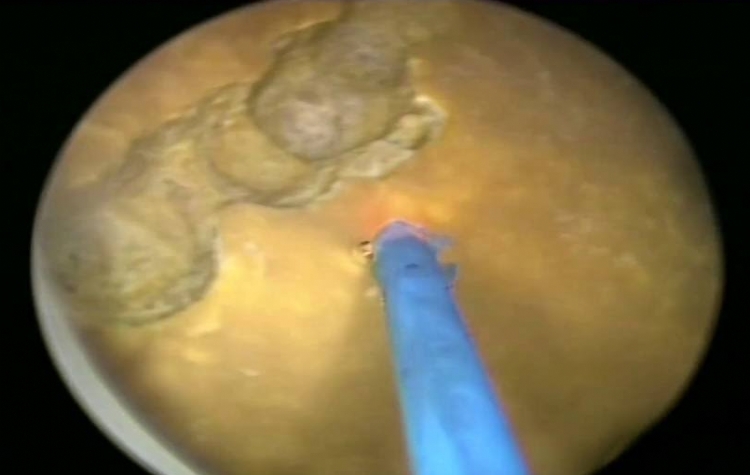Bladder stone can be broken with laser in the same session with HOLEP surgery
Benign prostate enlargement does not cause a serious problem in the urinary system (bladder, kidneys) in the early stages, and the complaints related to prostate enlargement are reduced with medication and patients are relieved. Over time, these drugs become insufficient in treatment and surgical treatment (surgery) may be required for prostate enlargement.
Conditions that require surgical treatment, that is, surgery, in benign prostate enlargement are as follows:
Inadequate drug therapy
Dilatation in the upper urinary system (hydronephrosis, hydroureter)
Renal dysfunction
Globe development in the patient (inability to urinate)
Excess urine remaining in the bladder after urinating (100-150 cc and above)
Frequent urinary tract infections
Bladder stone formation
Stone formation in the bladder is a condition encountered in BPH patients. The formation of bladder stones in benign prostate enlargement is the pressure of the enlarged prostate on the urethra (urinary tract), and as a result, the bladder cannot be fully emptied and recurrent urinary tract infection. The definitive treatment of this vicious circle, that is, urine remaining in the bladder as a result of urination, and urinary tract infection, is to correct and eliminate the condition that prevents the urinary flow. This is only possible with surgical treatment. Bladder stones may be the result of obstruction due to the prostate, as well as in the form of stones formed in the kidney or ureter as a result of long-term growth of stones that fall into the bladder. Their treatment is to break them again by sudden surgery or laser method.
Commonly used methods in the surgical treatment of benign prostate enlargement that does not respond to drugs: Open prostate surgery, TUR (monopolar, bipolar TUR, plasmakinetic) and HOLEP surgery. If prostate patients also have bladder stones, the stone must be removed together with the prostate. There is no effective treatment for bladder stones other than surgical removal or laser breaking. Herbal treatments or alternative medicine treatments are not effective treatments that can be recommended for dissolving or reducing stones.
In case of bladder stone formation due to prostate enlargement, it can be taken in the same session as the prostate in the bladder. For this, the patient does not need to be operated again later. In cases where the prostate is removed by open surgery, bladder stone is also known as open. This is a very simple method, since the bladder (urinary bladder) will be opened to remove the prostate, the stone in the bladder is easily removed at this time. With HOLEP surgery, stones formed in the bladder during prostate surgery are also broken into very small pieces with a holmium laser and removed. The process of breaking the stone in the bladder is usually done before the prostate, as there will be some bleeding during the prostate surgery and it will distort the image.
Bladder stones can sometimes be large and hard, so the duration of the surgery may be slightly longer depending on the size and hardness of the stone. It is an important advantage to break the stone in the bladder with the same system during the HOLEP surgery, which is used in the treatment of benign prostate.
Prof. Dr. Emin ÖZBEK
Urology Specialist


Leave a Reply